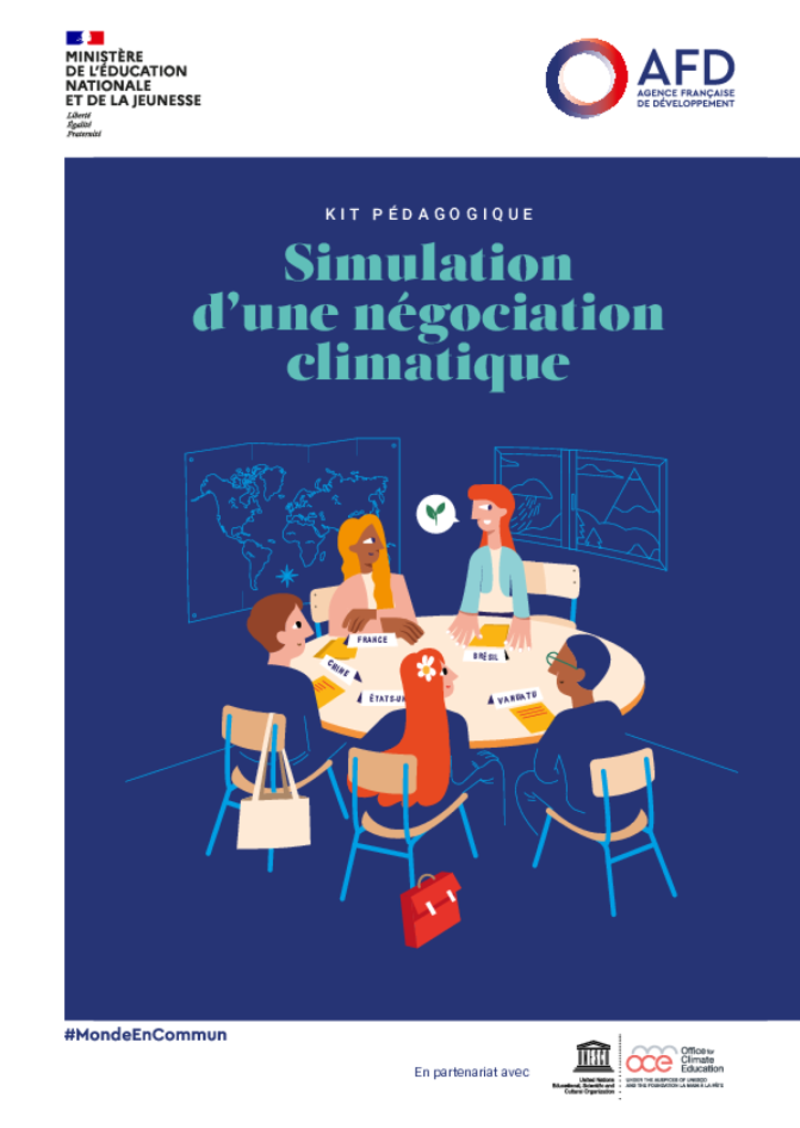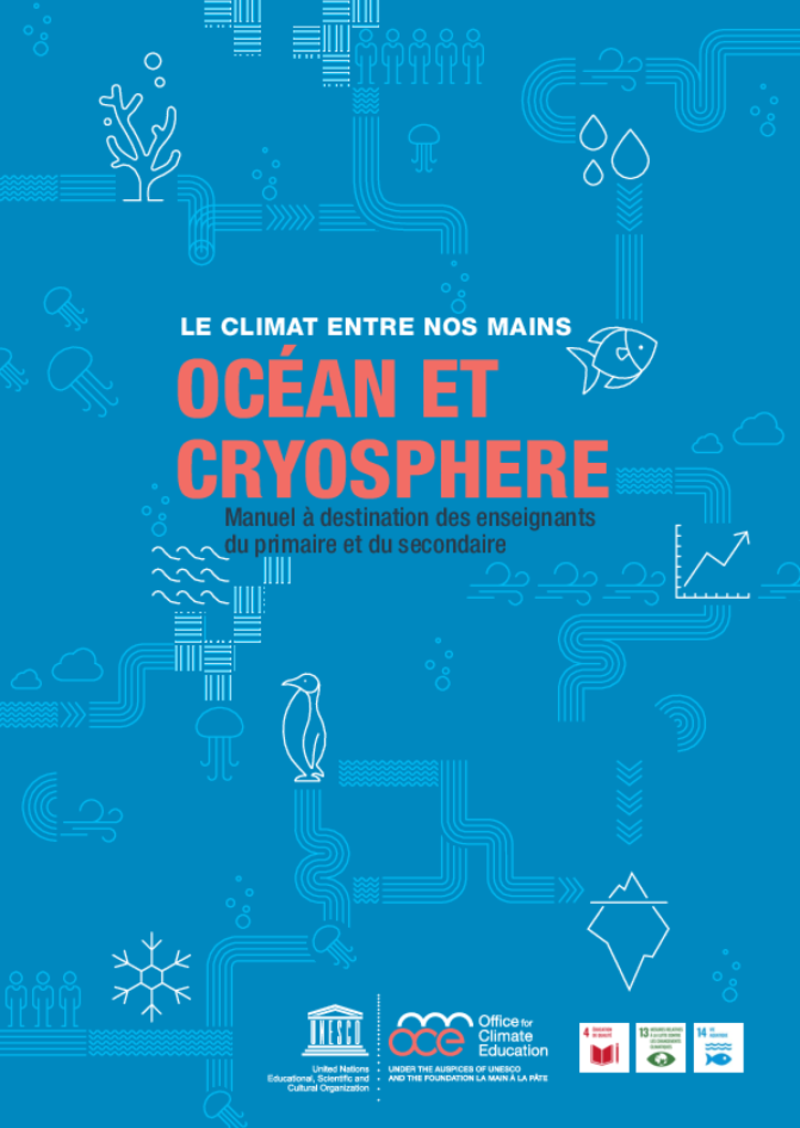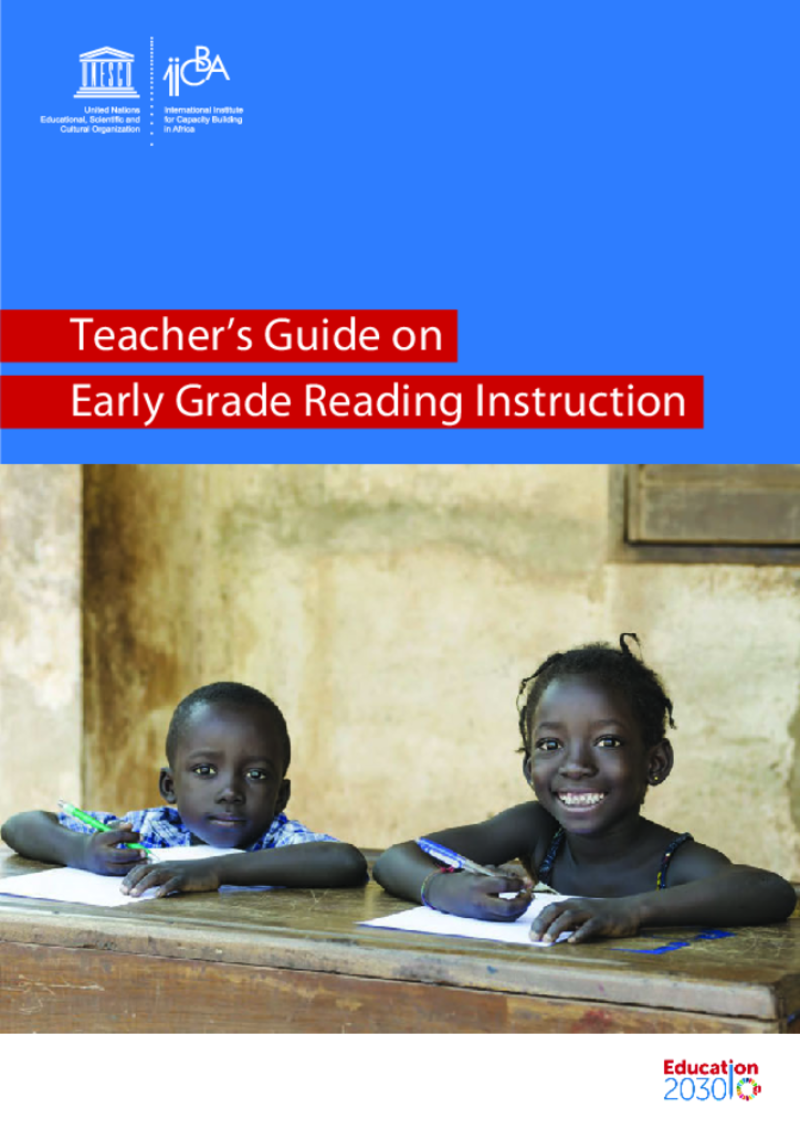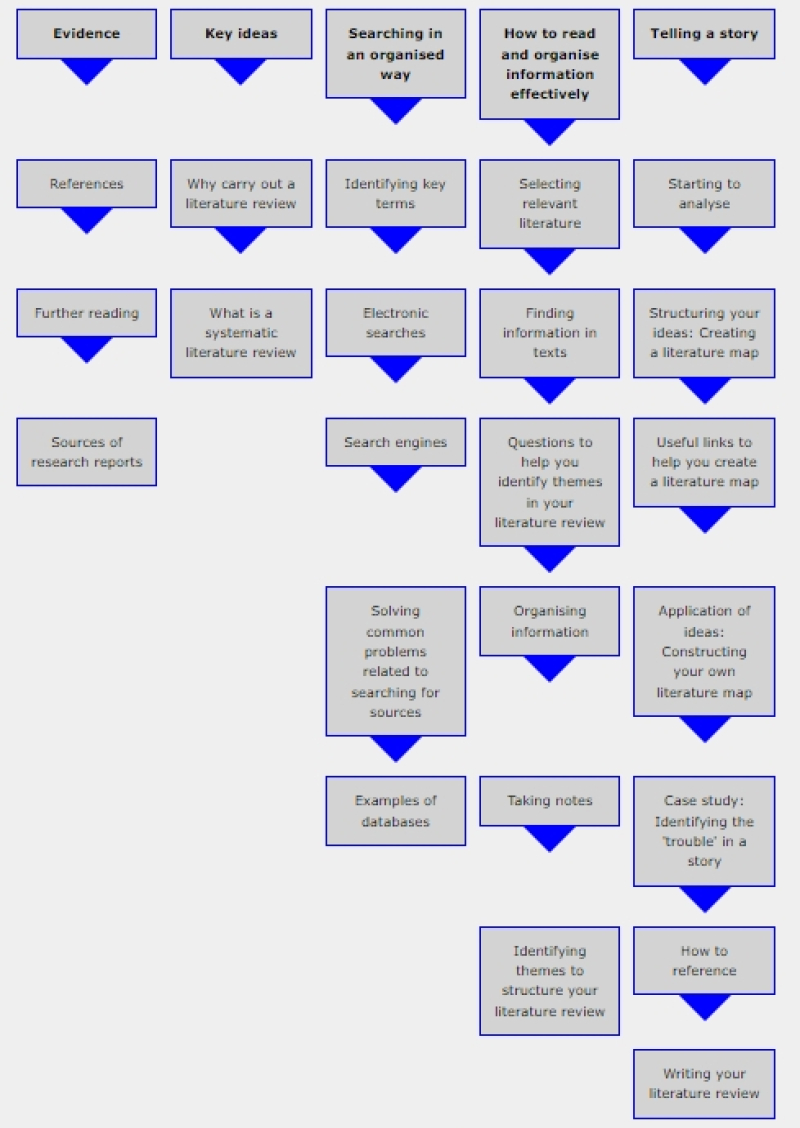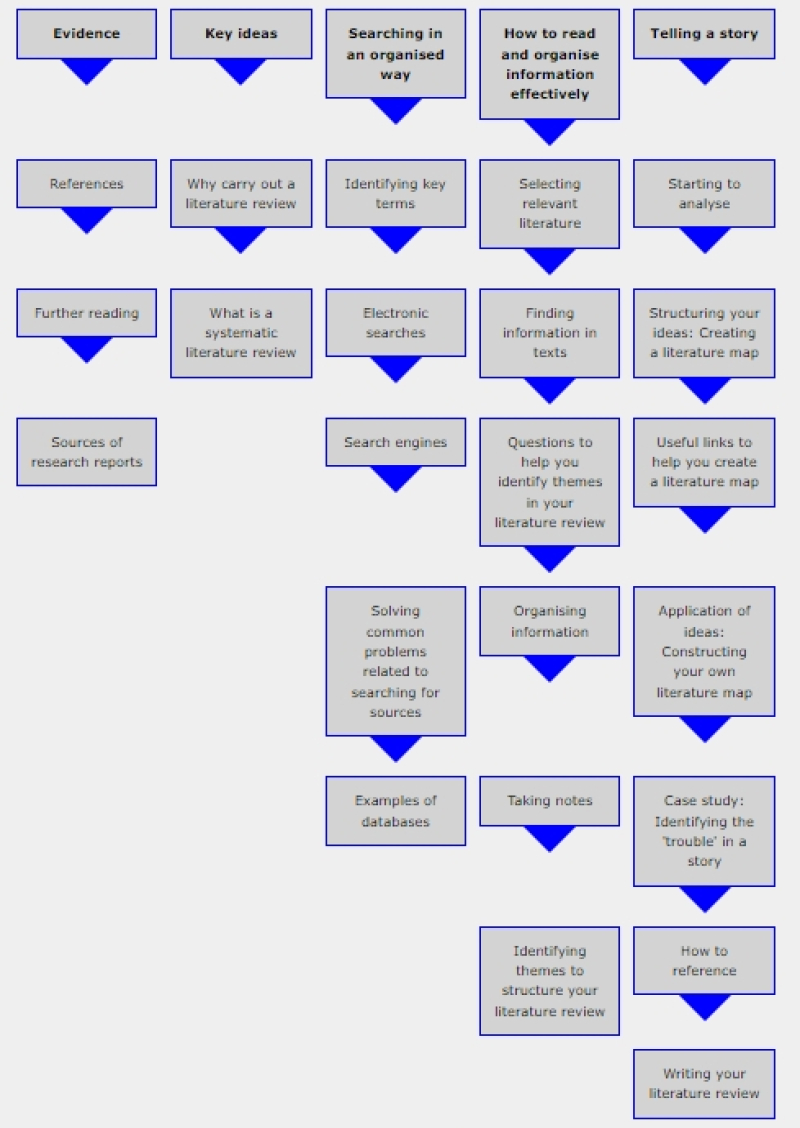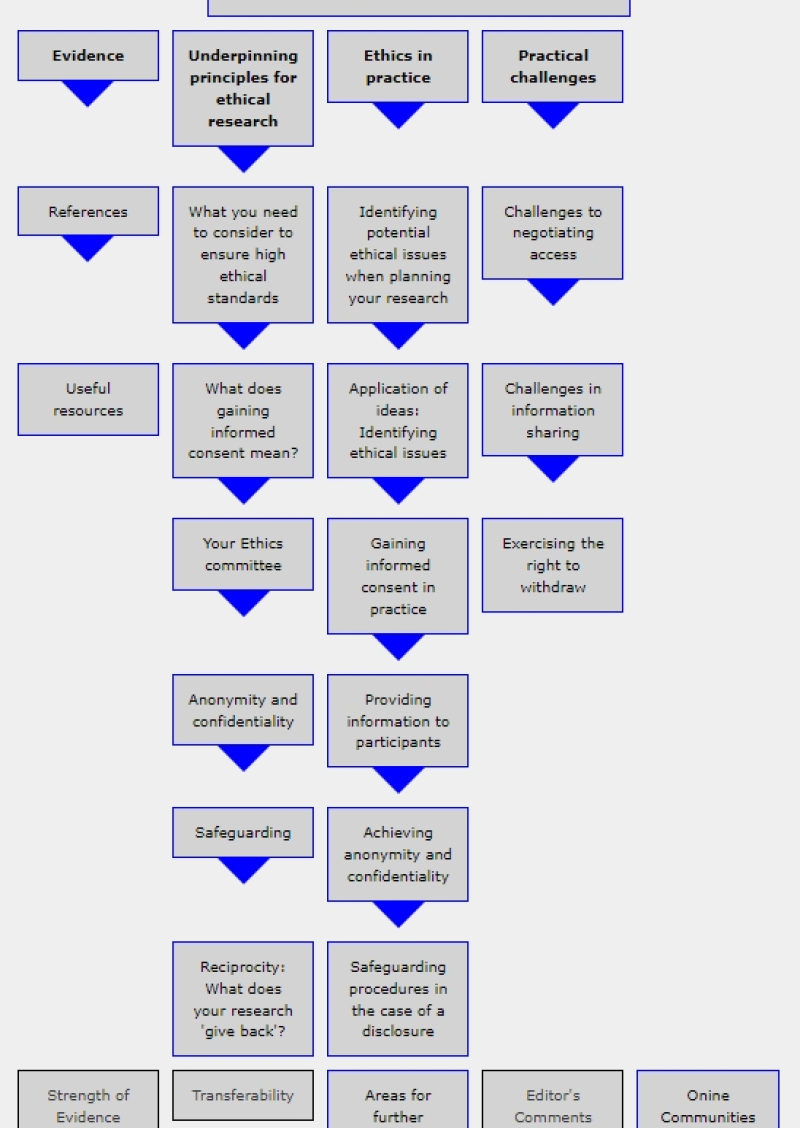Teacher Resource Centre
Displaying 1 - 13 of 13
Simulation d'une négociation climatique, kit pédagogique à l'usage des enseignants du secondaire
Ce guide de simulation de négociation climatique, destiné aux enseignants du secondaire, s'appuie sur le référentiel national de compétences climatiques français. Il propose des activités pédagogiques pour comprendre les enjeux climatiques, simuler une COP et agir pour le climat. Adaptable aux différents contextes, il inclut des ressources multimédia et utilise des pédagogies actives comme les jeux de rôle et les débats. Les séances sont conçues pour être flexibles, permettant aux enseignants de choisir celles qui répondent le mieux à leurs besoins tout en maintenant un équilibre entre compréhension et action.
Le Climat Entre Nos Mains - Océan et Cryosphère, Manuel à destination des enseignants du primaire et du secondaire
Ce manuel de l’Office for Climate Education (OCE) aide les enseignants à aborder le changement climatique, les océans et la cryosphère avec des élèves de 9 à 15 ans. Il propose des éclairages scientifiques, des plans de cours, des activités et des ressources multimédia. Interdisciplinaire, il inclut des leçons en SVT, sciences sociales, arts visuels et éducation physique, et utilise des méthodes pédagogiques actives comme l’investigation, le jeu de rôles et le débat. Divisé en deux parties, "Comprendre" et "Agir", il permet aux élèves de comprendre les impacts du changement climatique et de participer à des projets concrets pour atténuer ses effets.
Play & resilience: a toolkit for teachers, caregivers, and other stakeholders
Play is an easy, natural and universal practice that builds resilience. Play comes naturally to all children- and is a seemingly simple and light-hearted phenomenon. The power of play as a pathway to building resilience needs to be leveraged to provide children with the opportunity to further explore play in their home and school environments.
This toolkit is therefore premised on the objectives to build the capacity of various stakeholders such as caregivers/teachers, school managers, curriculum planners and policy makers who are key actors in the process of growth and development of children. It is also aimed at equipping these stakeholders with the knowledge and pedagogical skills to translate research, policy and curriculum to practical knowledge and activities for children in the school environment. The toolkit offers directions for facilitators who will be working with caregivers/teachers using the materials and resources provided and other relevant materials available in an environment where it will be used.
Teacher's guide on early grade reading instruction
Reading is a fundamental ability for all other learning activities. Students can learn only when they comprehend, and this requires appropriate reading skills in the first place. Appropriate reading skills support the learning of increasing amounts of instructional content. This is why children who fail to learn to read during their early years of schooling will encounter more difficulties in later grades and a higher risk of drop out. Quality early grade reading instruction is critical in preventing these challenges and risks as well as in protecting children’s rights to education and ensuring better chances of success in their life.
Teachers are at the center of reading instruction and they need to be trained with pedagogical knowledge and management skills in order to provide students relevant and quality instruction. It has however been noted that teachers in many countries, especially low-income countries in sub-Saharan Africa, lack the proper training and support on ways of teaching early grade reading to their students. Therefore, a comprehensive and practical guide on early grade reading is highly needed to bridge this gap.
This guide aims to empower teachers in Africa by equipping them with the knowledge and skills of early grade reading, including the simple identification of the main pillars of reading, lesson planning and classroom management, taking into account the context in Africa. Subsequently, these teachers will help their students build basic reading skills in their early years of schooling.
A Teacher's Guide for Arts, Music and Drama in Africa
Art, music and drama have had a pivotal role in the livelihood of human beings. This is clear by the wealth of literature, architecture, fine art, theater and music that define human past, present and future. The inherent creative ability and a yearning to express ourselves is what gives value to art, music and drama as companion components in human evolution.
This teacher's guide covers art, music, dance, drama, experiential learning, community engagement, and how to integrate these aspects into curriculum. Additionally, this document provides lesson plans for primary school students in these subject areas.
Research Methods: Developing your research design
This MESHGuide is designed to provide teachers with practical strategies to develop interesting and relevant research questions and to formulate a research design to engage in research-informed practice in their school or setting.
This MESHGuide draws on a range of key literature in the field of social science research, and it has been informed by lessons learned from the author's research. The guide aims to help teachers to:
- understand the purpose of a research design
- understand the significance of formulating a research question
- develop the initial focus of your research by exploring different potential starting points for this
- understand different ways of categorising research questions
- identify the characteristics of good research questions and apply these in practice
- develop and evaluate your own research questions
- operationalize your research aim so that you can develop appropriate research tools to answer your research questions by developing question-method connections in your own research
- improve your research data through understanding the nature of validity and reliability and exploration factors that could impact on these
Research Methods: Doing a literature review
This guide is designed to help teachers to:
- understand how to use other people’s writing to inform their own research;
- develop a strategy for carrying out a search of the literature;
- organise the themes logically;
- evaluate the research they read;
- think about the features of a reflective literature review and explore how to achieve this in practice
This MESHGuide draws on a range of key literature in the field of social science research. Also its design has been informed by lessons learned from the author's research, which has focused on the following areas:
- developing effective collaborative learning in science
- factors influencing learning through play in the early years
- student teachers’ engagement with research and its impact on their developing practice
- constructivist informed practice in science within initial teacher education
- creativity in learning and teaching.
Research Methods- Considering Ethics in your research
This MESHGuide draws on a range of key literature in the field of social science research ethics. It is designed to help teachers to:
- Understand the significance of ethical concerns in the research process
- Identify the nature of the ethical issues that may be of significance in the design and implementation of their research
- Develop their research design in a way that takes into account ethical considerations, so that their research is as ethical as possible
- Understand the complexity of the process of gaining informed consent and enable them to achieve this
- Reflect on the complexity of research ethics
Teaching to prevent atrocity crimes: a guide for teachers in Africa
This is UNESCO's first resource with a regional focus on teaching to prevent atrocity crimes. It was developed with the United Nations and in partnership with the UNESCO International Institute for Capacity Building in Africa (IICBA). The guide was informed by exchanges with African stakeholders and advisors and tested through a piloting exercise with African teachers and students. It provides principles for teachers to consider in facilitating learning and constructive discussions with their students.
Transformative pedagogy: a teachers’ guide for peace and resilience building in North Africa
This guide is designed to build the capacity of teachers so that they are informed and empowered in why and how to educate for peace-building. It offers an analysis of conflict, examines the role of ethics, expands on the elements of transformative pedagogy. It also provides practical tools to support learners’ active participation in shaping the world around them and assess learners’ understanding of peacebuilding concepts and skills, all while engaging the community.
Youth empowerment for peace and resilience building and prevention of violent extremism in Sahel and surrounding countries: a guide for teachers
This guide is designed to build the capacity of secondary school teachers and teacher educators to integrate a peace and resilience building approach in education for the prevention of violent extremism. It builds on the Transformative Pedagogy for Peace-building guide and it was contextualized to the context the Sahel and surrounding countries.
The guide redefines the role of teachers, inviting them to make a paradigm shift in adopting a transformative pedagogy that allows learners to actively participate in their own learning. Transformative pedagogy builds on active pedagogy and the competencies-based approach. The guide concludes with engaging learning activities to support experiential learning.
Transformative pedagogy for peace-building
This guide is designed to build the capacity of teachers so that they are informed and empowered in why and how to educate for peace-building. It offers an analysis of conflict, examines the role of ethics, expands on the elements of transformative pedagogy and provides practical tools to assess learners’ understanding of peacebuilding concepts and skills. It concludes with 20 engaging activities to support experiential learning.
The guide was developed as part of the "Teacher Training and Development for Peace-building in the Horn of Africa and Surrounding Countries project", which has as a long-term goal to develop a critical mass of teachers able to implement effective teaching and learning essential for preparing peace-loving and productive youth in Eritrea, Ethiopia, Kenya, Somalia, South Sudan and Uganda.
Transformative pedagogy for learning to live together in Southern Africa. A practical guide
This guide is designed to build the capacity of teachers and education planners so that they are informed and empowered in why and how to educate for living together and epace building . It offers an analysis of conflict, examines the role of ethics, expands on the elements of transformative pedagogy and provides practical tools to promote learners’ active participation in shaping the world around them and assess their understanding of citizenship and peacebuilding concepts.
Transformative pedagogy empowers both teachers and learners. It encourages learners to be reflective and critical thinkers capable of contributing meaningfully as members of local and global communities. It also redefines the role of teachers. Teachers become facilitators with the disposition, knowledge, skills and commitment to support students in developing their full potential as peacebuilders. This guide can serve in universities, teacher training colleges and schools.
